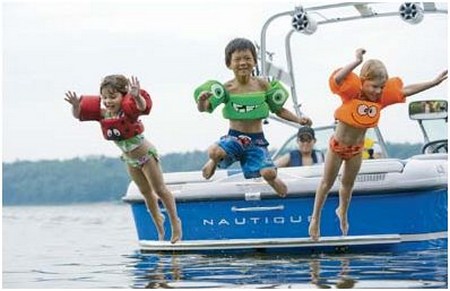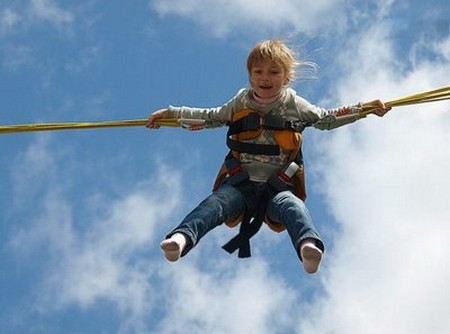Give your child the freedom to explore the world, within the bounds of health and safety. In so doing, you’ll be giving your child the confidence that comes from knowing, “I don’t need to be afraid of a new experience.”
Many parents hold on too tightly. Others don’t care enough. Where is the fine line of a balanced approach? In a broad sense, that line can be summed up in one phrase: Keep small children within eyesight or earshot (whenever you are outside your home).

Keep your children within eyesight or earshot until you are certain they are near another adult that cares about them and will assume responsibility for them.
Watch your child walk to the school bus until he or she gets on it. Watch your child enter the door of the Sunday school classroom. Check on your child every few minutes as he or she plays outside in the yard— even if it’s just a glance through a window or a pause to listen for the sound of his or her voice. Watch your child in the park, even if you are seated several yards away on a bench. Make certain that a playmate’s parent is home and that the parent knows your child is coming to visit before you drive away.
Does this take effort? Yes. Responsible parenting always takes effort.
One of the milestones of my childhood came the day that our family went to Disneyland and my parents said, “You and your brother can do whatever you want for the next hour. You both have wristwatches. Here are your ticket books. Meet us right here in an hour. If you do that, we’ll know we can trust you to be on your own for another hour or so.”
Unknown to us, Mom and Dad followed us from a distance for the next hour, to make certain we didn’t stray from our instructions or fail to wait patiently in lines. My brother and I felt great freedom and a great deal of responsibility for being “on our own” for a while. We probably took greater care of each other and showed more constraint than we would have had our parents been right at our sides! We were careful to return on time. And, we were both proud that we had done something without adult supervision. It was only years later that we learned that Mom and Dad had been a hundred feet away at all times. We were within their eyesight, even if they weren’t within ours.
Is your child wanting to be alone with friends at the fair? Watch from afar. Does your fourth-grade son want to walk to school with his friends? Watch from afar at least until his feet hit school property. Does your ten-year-old daughter want to shop with her friends at the mall? Shop, too, and keep track of her from afar.
When do you stop watching? As your child enters teen years and proves himself or herself to be trustworthy, you can decrease the vigilance. It is still your responsibility, however, to know where your teen is and where he or she can be reached by phone.
Even as you are watching, encourage your child to explore his or her world. Suggest that he or she climb that tree, try the slide, walk out to the end of the dock and look for fish, and run ahead of you on the beach to explore the tidal pools. Let your child try the scales for a penny and take a blood pressure reading for a quarter.
Let your child find things for you and do things that carry responsibility. “Jimmy, will you please run and get a quart of milk while I wait in the check-out line with the cart.” Or, “Caitlyn, will you please run out and put this coin in the parking meter for me.”

By encouraging the independent discovery of new things, you’re giving your child the confidence that, indeed, he or she is able to learn and cope with new experiences and information.
The child who is given the freedom to roam, to get dirty, to pick up frogs, and to jump from swings is the child who is going to get a bruise now and then. But this is also a child whose spirit and imagination will be allowed to soar.
A child with high self-esteem is a child who believes he or she can conquer something new even before the attempt—and even if he or she fails at it initially!